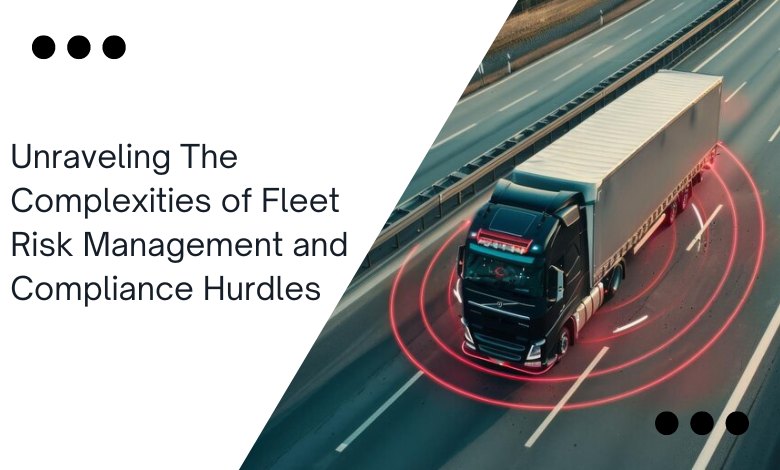Unraveling The Complexities of Fleet Risk Management and Compliance Hurdles

Nowadays, the business environment is more competitive than ever, and managing a fleet of vehicles efficiently and safely is crucial for success. Regardless of the industry, businesses rely heavily on fleets to deliver goods and complete essential tasks.
However, ensuring the safety of drivers, vehicles, and cargo while adhering to the ever-changing regulations can be daunting. In this article, we’ll explore the intricacies of fleet risk management and compliance.
We will also learn how advanced vehicle tracking and monitoring solutions can help businesses navigate these challenges.
Fleet Risk Management: Everything You Need to Know
Fleet risk management refers to the strategic approach of identifying, assessing, and mitigating risks associated with operating a fleet of vehicles. These risks can encompass various aspects, including:
Driver Behavior

This is a major contributor to accidents and can be influenced by several factors, such as speeding, fatigue, or distracted driving. The consequences can be an increased risk of accidents and injuries.
Maintenance

Poorly maintained vehicles are more prone to breakdowns and can delay critical deliveries. Additionally, they can leave drivers stranded in inconvenient or even dangerous locations, which can lead to frustrated customers and lost business opportunities.
Accidents
A collision, regardless of the fault, can result in injuries, vehicle damage, and downtime, which can cause losses to the business. Repairing or replacing such vehicles can be a significant burden for your business.
Security

Losing a vehicle or cargo to theft can be a major financial setback and significantly disrupt operations. Also, unauthorized individuals using company vehicles for personal reasons can pose security risks and expose the business to liability.
The Challenges of Legal Compliance
Managing and mitigating fleet risks is a challenging task, what makes it more complicated is the legal compliance. Although these regulations can vary based on several factors, some of them include:
Safety Standards
According to the regulations, vehicles must meet safety standards regarding brakes, tires, lights, and other critical components. All commercial vehicles require periodic inspections to obtain a Fitness Certificate, verifying that they are roadworthy and meet safety standards.
Operational Regulations
Authorities have limited the number of hours a driver can operate a vehicle continuously to prevent fatigue and ensure safety.
Driver Licensing
All drivers must possess valid commercial driving licenses (depending on vehicle type) with appropriate endorsements. Valid medical clearances are also required to operate vehicles.
Fleet managers must stay updated on the latest compliance requirements. Non-compliance can lead to fines, penalties, legal action, and even the suspension of operations.
How Vehicle Tracking and Monitoring Solutions Simplify Fleet Management and Compliance
Modern fleet management systems are designed to address all risks associated with fleet management. These tools offer the ultimate convenience of managing vehicles and drivers to ensure maximum safety, protecting your business from unforeseen losses.
The features include:
Real-Time Tracking and Geofencing

Tracking vehicles in real-time and setting geofenced areas can prevent theft and unauthorized use. This helps optimize routes, reduce idle time, and improve delivery times.
Driver Behavior Monitoring

Tracking driver behavior, such as speeding, harsh braking, and acceleration, allows for targeted training and incentivizes safe driving habits. Proactive behavior monitoring can significantly reduce the risk of accidents, thereby protecting both drivers and vehicles. In fact, driver drowsiness detection solutions
driver drowsiness detection solutions go a step further by ensuring that accidents are averted owing to sleepy or over-tired drivers, by an innovative module alerting module!
Predictive Maintenance
By monitoring your health, you can predict maintenance schedules to prevent unexpected breakdowns. This helps ensure vehicles are always ready for duty while enhancing their lifespan.
Compliance and Reporting
Automated reporting and compliance tracking using VTMS ensure that vehicles and drivers adhere to industry regulations, avoiding costly fines and legal issues. The streamlined reporting systems provide accurate records for audits and insurance claims, simplifying administrative processes and enhancing transparency.
Cost Management
VTMS also helps monitor fuel consumption, reducing the risks of theft. Businesses can easily record fuel usage and refills to manage overall costs.
Final Thoughts
Dealing with the complexities of fleet risks is no small feat, but with a Vehicle Tracking and Monitoring Solution, it becomes manageable. Asti Infotech’s VTMS is an advanced fleet management system that provides a multi-faceted approach to risk management, ensuring safety, efficiency, and profitability.
Contact us today to turn the risks of fleet management into a streamlined, effective process and drive your business toward greater success.
FAQ’S
What is fleet risk management, and why is it important?
Fleet risk management is a strategic approach to identifying, assessing, and mitigating risks associated with operating a fleet of vehicles. It is crucial because it helps ensure the safety of drivers, vehicles, and cargo, while also reducing the likelihood of accidents, breakdowns, and theft. Effective fleet risk management can lead to improved operational efficiency, cost savings, and compliance with legal requirements.
How can driver behavior impact fleet risk and what measures can be taken to mitigate this risk?
Driver behavior significantly impacts fleet risk, as factors like speeding, fatigue, and distracted driving can lead to accidents and injuries. To mitigate this risk, businesses can monitor driver behavior using advanced tracking systems, provide targeted training to address unsafe driving habits, and implement driver incentives for safe driving practices. Additionally, solutions like driver drowsiness detection systems can alert drivers and prevent accidents caused by fatigue.
What are the common legal compliance challenges in fleet management?
Legal compliance challenges in fleet management include adhering to safety standards for vehicle maintenance, ensuring drivers do not exceed regulated driving hours, and maintaining valid commercial driving licenses with necessary endorsements and medical clearances. Non-compliance can result in fines, penalties, legal action, and suspension of operations. Staying updated on the latest regulations and using automated compliance tracking systems can help manage these challenges.
How do vehicle tracking and monitoring solutions enhance fleet management?
Vehicle tracking and monitoring solutions enhance fleet management by offering real-time tracking, geofencing, and driver behavior monitoring. These features help prevent theft, unauthorized use, and improve route optimization. Predictive maintenance tools ensure vehicles are well-maintained, reducing breakdowns and extending vehicle lifespan. Automated compliance and reporting systems help avoid legal issues, and fuel consumption monitoring aids in cost management.
What benefits does predictive maintenance offer for fleet management?
Predictive maintenance offers several benefits for fleet management, including the prevention of unexpected vehicle breakdowns, ensuring vehicles are always ready for duty, and enhancing their lifespan. By monitoring vehicle health and predicting maintenance needs, businesses can schedule timely repairs and maintenance, reducing downtime and improving overall fleet reliability and efficiency.
Quick Read: Role & Responsibilities of a Modern-day Fleet Manager